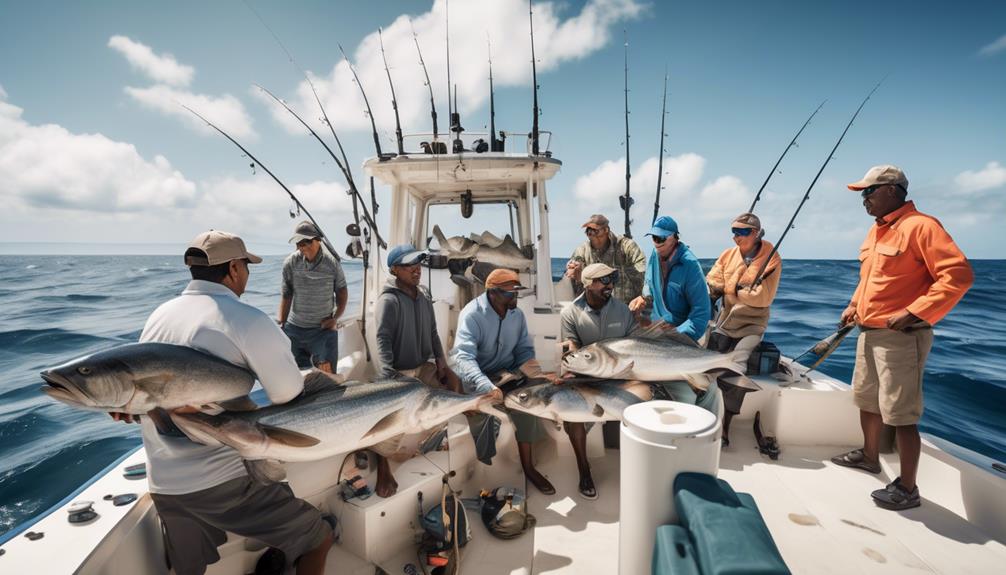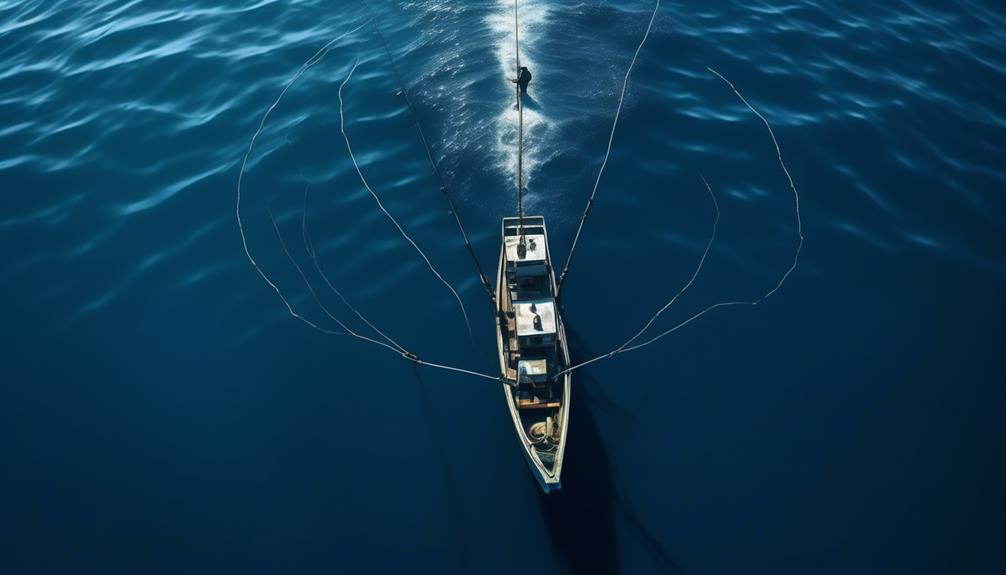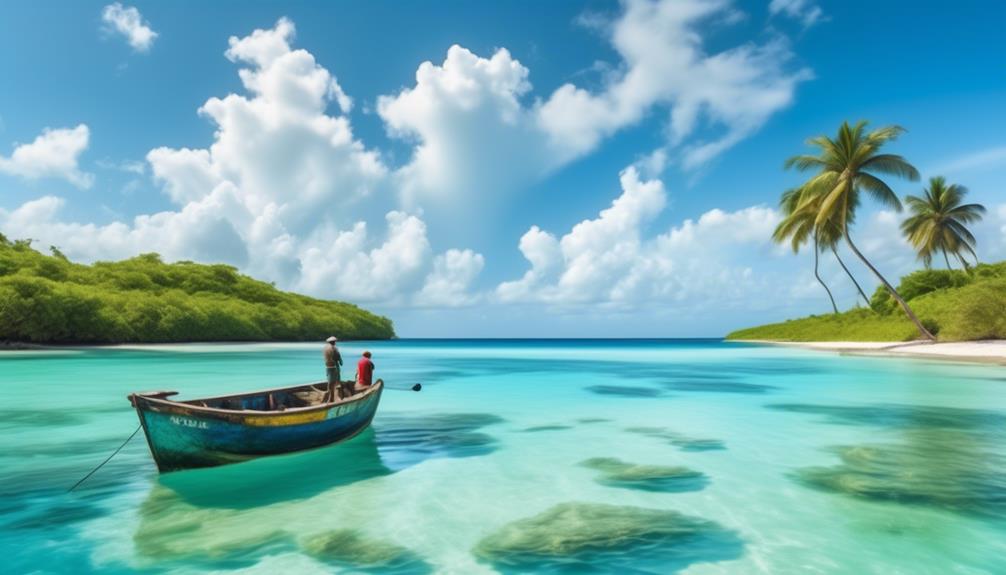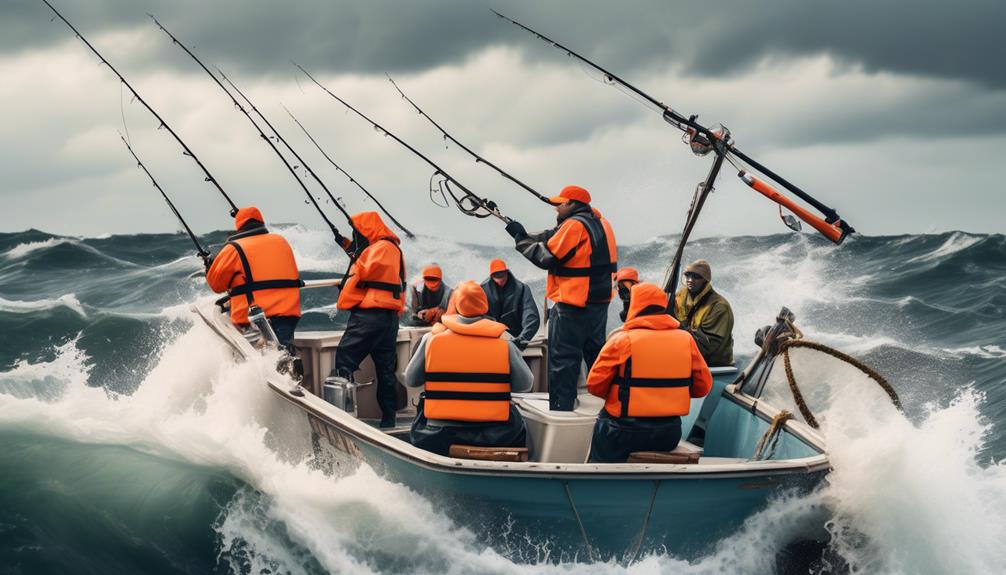Imagine embarking on a deep sea fishing expedition without the guidance of a professional. It's like navigating uncharted waters without a map or compass. The expertise of a seasoned guide can make all the difference between a successful catch and a day of frustration.
As you prepare for your next deep sea fishing adventure, you'll want to ensure that you're equipped with the top tips for making the most of your experience with professional guides. Whether you're a beginner or seasoned angler, there are key insights and strategies that can elevate your deep sea fishing game to new heights.
Choosing the Right Professional Guide
When selecting a professional guide for deep sea fishing, prioritize experience and knowledge of the local fishing grounds to ensure a successful and enjoyable expedition. Guide qualifications are crucial when choosing the right professional for your deep sea fishing trip. Look for guides with extensive experience in deep sea fishing, preferably with certifications or licenses that demonstrate their expertise. A seasoned guide won't only enhance your chances of a successful catch but also prioritize your safety and enjoyment on the water.
In addition to qualifications, guide communication is key. A good professional guide should be an effective communicator, able to clearly convey instructions, share their knowledge, and engage in meaningful conversation throughout the trip. Before booking, take the time to speak with potential guides to gauge their communication style and ensure that it aligns with your expectations. An open line of communication won't only enhance your fishing experience but also contribute to a more enjoyable and informative outing.
When it comes to deep sea fishing, the right professional guide can make all the difference. By prioritizing guide qualifications and effective communication, you can ensure that your deep sea fishing trip isn't only successful in terms of the catch but also enjoyable and memorable.
Selecting the Ideal Deep Sea Fishing Location
To maximize your deep sea fishing experience with the right professional guide, the next step is selecting the ideal deep sea fishing location that aligns with your fishing goals and preferences. When choosing a location, consider the weather conditions and the fish species you're targeting. Different fish species thrive in specific water temperatures, so understanding the weather patterns of a potential location is crucial.
Warmer waters are home to species like marlin, tuna, and mahi-mahi, while colder waters are abundant with cod, salmon, and halibut. Research the typical weather patterns of potential fishing spots to ensure they align with your preferences and the behavior of the fish you hope to catch.
Additionally, consider the abundance and variety of fish species in the area. Some locations may be known for a particular species during specific seasons, providing the opportunity for a targeted fishing experience. Research the types of fish that frequent different locations and choose one that aligns with your interests. If you have a specific fish species in mind, ensure that the location you select is known for hosting that type of fish.
Understanding Local Fishing Regulations
Before embarking on your deep sea fishing trip, familiarize yourself with the local fishing regulations to ensure compliance and a successful fishing experience. Understanding local conservation and sustainable fishing practices is crucial for preserving marine ecosystems and ensuring the longevity of fishing opportunities.
Local regulations can vary widely and may include restrictions on catch limits, minimum size requirements for certain species, designated fishing areas, and prohibited gear types. By familiarizing yourself with these regulations, you can contribute to the conservation of fish populations and their habitats while also avoiding potential fines or penalties.
To start, research the specific regulations for the area where you plan to fish. Local fishery management agencies or professional fishing guides can provide valuable information on current regulations. Additionally, many regions have marine protected areas or specific seasons for certain fish species to allow for breeding and population replenishment. Being aware of these regulations will help you plan your trip effectively and ensure that you're fishing responsibly.
Moreover, sustainable fishing practices, such as catch and release for certain species or using barbless hooks to minimize harm to fish, are often encouraged or even mandated in certain areas. It's important to embrace these practices to support the long-term health of the marine environment and fish populations.
Properly Equipping for Deep Sea Fishing
As you prepare for your deep sea fishing adventure, ensuring you have the proper equipment is essential for a successful and enjoyable experience on the water. Selecting appropriate gear is crucial for deep sea fishing.
Start with a reliable rod and reel suitable for offshore fishing. Look for a sturdy rod that can handle the weight of larger fish and rough currents. Pair this with a high-quality reel that has a strong drag system to tackle the powerful pulls of deep-sea fish.
Additionally, it's important to understand fishing conditions. Deep sea fishing often involves unpredictable weather and strong currents, so having the right gear to adapt to these conditions is vital. Consider investing in a variety of sinkers, lures, and bait to adjust to different water depths and fish behaviors. It's also essential to have a well-stocked tackle box with extra lines, hooks, and other terminal tackle.
Understanding the fishing conditions will help you prepare for the specific challenges you may face on your deep sea fishing trip.
Lastly, don't forget to bring appropriate clothing and safety gear. Dress in layers to accommodate changing weather and ocean conditions, and always wear a reliable life jacket.
Best Practices for Bait and Tackle
Select the appropriate bait and tackle based on the specific fishing conditions and target species to maximize your chances of a successful deep sea fishing trip. When it comes to bait selection, consider the natural prey of the target species. For example, using live bait such as squid, mackerel, or sardines can be highly effective for catching larger predatory fish like tuna, marlin, or mahi-mahi. Additionally, using artificial lures that mimic the movement of smaller fish or squid can also attract the attention of your desired catch.
In terms of tackle maintenance, keeping your gear in top condition is crucial for deep sea fishing. Ensure that your reels are properly lubricated and that the drag is set according to the type of fish you're targeting. Check your lines for any signs of wear and re-spool if necessary to avoid losing a prized catch due to line breakage. It's also essential to inspect hooks for sharpness and corrosion, as well as to have a variety of hook sizes to match the different bait options.
Learning Techniques for Deep Sea Fishing
To master deep sea fishing techniques, focus on developing a keen understanding of the ocean's dynamics and the behavior of the marine species you aim to catch. Effective deep sea fishing requires knowledge of catching techniques and fish behavior.
When it comes to rod handling, it's essential to have a firm grip and maintain a good balance while casting and reeling in your catch. Proper rod handling ensures that you have control over the line and can respond quickly to the movements of the fish. Additionally, paying attention to reeling speed is crucial. Different fish species may require varying reeling speeds to entice them to bite or to prevent them from breaking free once hooked.
Understanding fish behavior is also vital. Different species exhibit distinct behaviors, such as feeding patterns and preferred habitats. By learning about these behaviors, you can adapt your techniques to increase the likelihood of a successful catch.
Observing the ocean's dynamics, such as currents, water temperature, and underwater structures, can also provide valuable insights into where fish are likely to be located.
Maximizing Safety on Deep Sea Fishing Trips
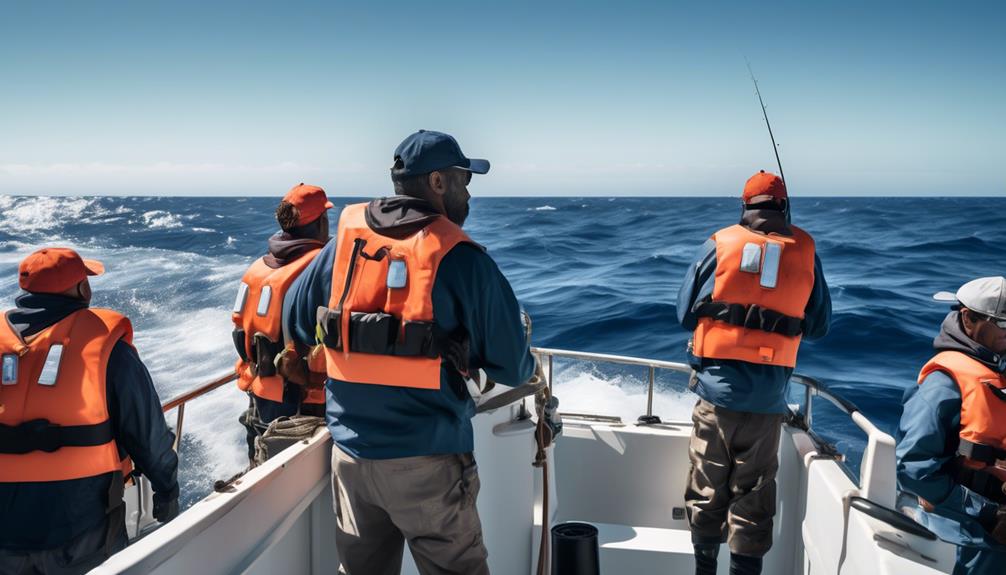
Ensuring your safety during deep sea fishing trips requires thorough preparation and adherence to essential safety guidelines. Deep sea fishing can be an exhilarating adventure, but it's crucial to prioritize safety protocols and emergency preparedness.
Here are some key tips to maximize safety on your deep sea fishing trip:
- Wear Personal Floatation Devices (PFDs): Always wear a properly fitted PFD, especially when you're on the deck of the boat. In the event of an emergency, a PFD can be a life-saving asset, providing buoyancy and keeping you afloat until help arrives.
- Stay Informed About Weather Conditions: Before heading out, check the weather forecast and sea conditions. Sudden changes in weather can pose serious risks, so it's important to stay updated and be prepared to alter your plans if necessary.
- Familiarize Yourself with Emergency Equipment: Take the time to locate and familiarize yourself with the emergency equipment on board, such as life rafts, fire extinguishers, and emergency position-indicating radio beacons (EPIRBs). Knowing how to use this equipment can be invaluable in the event of an emergency.
Tips for Ethical Deep Sea Fishing Practices
Familiarizing yourself with ethical deep sea fishing practices ensures a responsible and sustainable approach to this exhilarating adventure, complementing the safety measures emphasized earlier. Ethical fishing practices are crucial to minimizing the environmental impact of deep sea fishing trips.
To start, always adhere to catch limits and size regulations to support conservation efforts. By only keeping what you intend to consume and releasing the rest, you contribute to responsible angling and help maintain the balance of marine ecosystems.
Additionally, using circle hooks instead of J-hooks can significantly reduce the injury and mortality rates of released fish. Circle hooks are designed to hook the fish in the mouth, minimizing damage and increasing their chances of survival after being released. When handling fish, always wet your hands to protect their delicate skin and scales, then support their weight properly to avoid causing unnecessary harm.
Moreover, be mindful of the gear you use. Avoid lead sinkers, as they can be harmful to marine life if ingested. Opt for non-toxic alternatives such as tungsten or steel. Furthermore, properly dispose of any fishing lines, hooks, or other gear to prevent them from entangling or injuring marine animals.
Frequently Asked Questions
What Are Some Common Mistakes That Inexperienced Anglers Make When Deep Sea Fishing With Professional Guides?
When deep sea fishing with professional guides, inexperienced anglers often make common mistakes such as not following safety precautions, using the wrong bait, and not properly maintaining their fishing gear. It's important to listen and learn from the experts.
How Can I Best Prepare for the Physical Demands of a Deep Sea Fishing Trip?
To best prepare for the physical demands of a deep sea fishing trip, focus on stamina building and proper nutrition. Invest in quality deep sea fishing gear and maintain a balanced diet to keep your energy levels up.
Are There Any Specific Environmental or Conservation Efforts That I Should Be Aware of While Deep Sea Fishing?
When deep sea fishing, it's important to be mindful of the environmental impact. Conservation efforts, sustainable practices, and marine life respect are crucial. Always follow local regulations and guidelines to ensure the preservation of the ocean ecosystem.
What Are Some Advanced Techniques or Strategies That Professional Guides Use for Deep Sea Fishing?
When deep sea fishing with professional guides, they use advanced baiting techniques to attract specific species and employ catch and release methods to preserve fish populations. These strategies ensure a successful and sustainable fishing experience.
How Can I Ensure That I Am Being Respectful of the Marine Life and Ecosystem While Deep Sea Fishing?
When deep sea fishing, ensure you're respectful of marine life and the ecosystem. Practice responsible angling, support marine conservation, and preserve the ecosystem. Follow ethical fishing practices to minimize impact and maintain a sustainable environment for future generations.
Conclusion
Now that you have the top tips for deep sea fishing with professional guides, you're ready to embark on an unforgettable fishing adventure.
Remember to:
- Choose the right guide
- Select the perfect location
- Follow local regulations
- Equip yourself properly
Learn the best:
- Bait and tackle practices
- Fishing techniques
And prioritize:
- Safety and ethical practices
With these tips in mind, you'll be well-prepared for an exciting and successful deep sea fishing trip.
Happy fishing!
